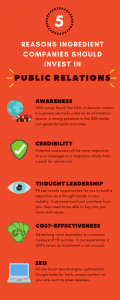Kirsty Yull, Account Executive, Ingredient Communications
Rumour has it Bill Gates once said that if he was down to the last dollar of his marketing budget, he’d spend it on public relations (PR).
While they wouldn’t necessarily go that far, most ingredient companies understand the importance and value of PR. However, many others remain to be convinced. Perhaps this is because PR as a profession sometimes gets a bad name in the media, or perhaps it’s because some see it as an unnecessary luxury.
Either way, it’s a serious mistake to overlook the importance of a good PR strategy. Whether your audience is consumers (B2C) or other businesses (B2B), PR can impact everything, from your standing with customers, to the morale of your employees. Perhaps most importantly, it can drive sales.
Need more convincing? Here are five reasons ingredient companies should take PR seriously
1. Awareness
A 2016 survey found that 94% of decision makers in business use the trade press as a source of information. B2B media ranked higher than trade fairs, sales calls, direct mail and promotional brochures. While all of these are highly effective activities, this research suggests that it would be unwise to adopt them without having a PR strategy in place.
It’s not surprising therefore that a strong presence in B2B media can generate leads and drive healthy sales figures.
2. Credibility
PR isn’t the only way to communicate to potential customers, but it’s one of the most effective because of the credibility it can give you. Advertising and other forms of paid promotion are important, but a potential customer might be more responsive to your messages in a magazine article than a paid-for advertorial. That’s because they know it has gone through a journalist- a third-party source they know and trust.
3. Thought leadership
Customers don’t just purchase your product or service. They need to be able to trust and buy into your vision and values.
Thought leadership is the attainment of status as an agenda-setter, and/or a trusted industry voice. But however great your ideas are, or how charismatic your CEO is, making your vision and values known can be difficult and time-consuming, especially in a competitive sector such as the ingredient industry. PR can create opportunities for you to build a reputation as a thought leader, whether it’s through opinion pieces in key media, or platforms at industry events.
4. Cost-effectiveness
It’s sometimes tough to persuade those who control the purse-strings that PR is worth investing in.
Partly this is because there is a common misconception that it does not offer enough value, or that its value cannot be calculated. Neither is true.
Among numerous other methods of evaluating PR success, one common measure is advertising value equivalent (AVE). This puts a figure on the amount you would need to spend on advertising to generate the same media presence you get from coverage generated by PR.
We sometimes calculate AVE for our clients. A 500% return on investment from PR is not unusual.
5. SEO
PR can also boost your search engine optimisation (SEO).
Google looks for fresh, unique content on your site, such as press releases. Naturally, popular media sites are prominent on Google, and a link back to your website will also boost your SEO.
Conclusion
Having a PR strategy in place is important for virtually every company, whatever its size. It is particularly important for ingredient companies because of the ever-changing and competitive nature of our industry.
If PR isn’t already part of your marketing strategy, it definitely should be.



